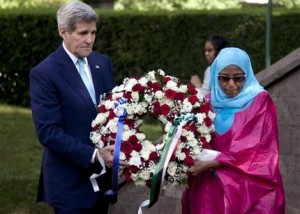BY

NAIROBI, Kenya (AP) — Secretary of State John Kerry commemorated the victims of Kenya’s past and present terror attacks Monday, and offered American support in the fight against an increasingly diffuse but perhaps more dangerous terror threat emanating out of Somalia. His trip to the African country coincides with improving U.S.-Kenyan ties and sets the stage for President Barack Obama’s visit this summer.
Kerry laid a wreath for the victims of the deadly 1998 bombing of the U.S. Embassy in Kenya and offered condolences to families and friends of the 148 people, mainly students, massacred at a Kenyan university last month.
The twin embassy attacks in Nairobi and the Tanzanian capital of Dar-Es-Salaam killed 224 people, the work of a rising al-Qaida just three years before the even deadlier Sept. 11 attacks against the U.S. homeland. Last month’s tragedy at Garissa University College was different, coming from an al-Shabaab network that is on the run in Somalia but expanding its activities elsewhere.
“Terrorists will always fail,” Kerry said at the site of the former embassy. “Yes, they can reduce a building to rubble. And yes, they can even deprive innocent people of their lives,” he said. “But they do not give anyone anything of what really makes life worthwhile.”
Americans and Kenyans have the power to fight back, Kerry emphasized, militarily and “through our unity and the character of our ideals.”
Earlier, he addressed the embassy’s current staff, which includes several employees that survived the attack 17 years ago. He praised their efforts.
Kerry’s presence in Kenya, however, comes shortly after a Justice Department decision not to award victims of the embassy bombings money seized from Sudanese accounts at a French bank. The U.S. says Sudan financed and supported the attacks in Kenya and Tanzania.
George Mimba, who headed embassy employees in Kenya at the time, said in statement that he and others were “deeply disappointed.”
The secretary of state, previewing Obama’s scheduled trip here in July, met later Monday with Kenyan President Uhuru Kenyatta.
U.S. relations with Kenyatta have improved since the International Criminal Court dropped charges of crimes against humanity against him in December. Those were linked to violence that killed hundreds of people after Kenya’s contested 2007 presidential election.
Tensions remain, however.
The U.S. believes Kenyatta should do more to improve human rights, from addressing the post-election killings last decade to stamping out continued incidents of police violence and pressure against journalists, activists and political opponents.
And on counterterrorism, where cooperation is close, both sides aren’t completely content with the partnership.
The Kenyans want a bigger U.S. footprint in the region to combat al-Shabaab, whose atrocities in Kenya include the 2013 attack on the Westgate shopping mall that killed 67 people.
The Americans think the Kenyans can be more effective in providing security at a time when al-Shabaab has encountered severe setbacks. And it is pressuring Kenyatta’s government not to follow through with threats to close the sprawling Dadaab camp for Somali refugees, which is the world’s largest at more than 300,000 inhabitants.
In recent years, drone strikes and other operations have taken out many leaders of the al-Qaida-linked group. It has lost control of southern Somalia and seen cash flows dry up.
But as the group has become more decentralized, experts say it also has adapted, becoming less focused on controlling territory and more on destabilizing the region.
“Al-Shabaab will continue its current pattern of attacks, likely undeterred by the United States,” the Council on Foreign Relations’ Alex Dick-Godfrey wrote in a recent blog post. “Coupled with Kenya’s inability to deter the group and a favorable global context, al-Shabaab looks like a more dangerous threat than even at the height of its power.”
Source: AP


